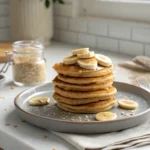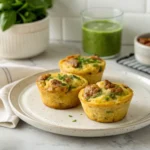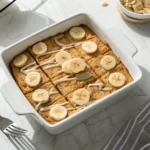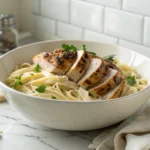The first time I tried cottage cheese pizza crust, I wasn’t aiming to reinvent anything. I just wanted something quick, protein-packed, and not another scrambled egg or grilled chicken dish. After a heavy leg day, I was craving pizza—but I didn’t want the usual greasy regret that follows a delivery box.
That’s when I grabbed what I had in the fridge: a tub of low-fat cottage cheese, a couple of eggs, some oat flour, and spices I always keep around. I’d seen cottage cheese pop up in a bunch of high-protein snack recipes, but I’d never thought of turning it into a crust. It sounded odd at first—but let me tell you, it totally changed my meal prep game.
What came out of the oven was golden, just crispy enough, and packed with flavor. And get this—it hit over 40 grams of protein in one meal without feeling heavy. I topped it with lean turkey slices and some veggie leftovers, and boom: pizza night, macro-friendly.
Now this cottage cheese pizza crust has become a Sunday ritual. It’s easy to make in batches, super adaptable, and holds up like a champ whether I’m cutting, bulking, or just trying to eat clean during a busy week. Honestly, it’s the snack that helps me stay on track without feeling like I’m missing out.
Table of Contents
What You Need To Make Cottage Cheese Pizza Crust
You don’t need anything fancy to make a solid cottage cheese pizza crust. Just a few basics from your pantry and fridge will get the job done. This crust is simple, clean, and perfect for anyone sticking to fitness goals. Whether you’re cooking for yourself or prepping ahead for the week, these ingredients are quick to pull together and easy to mix.
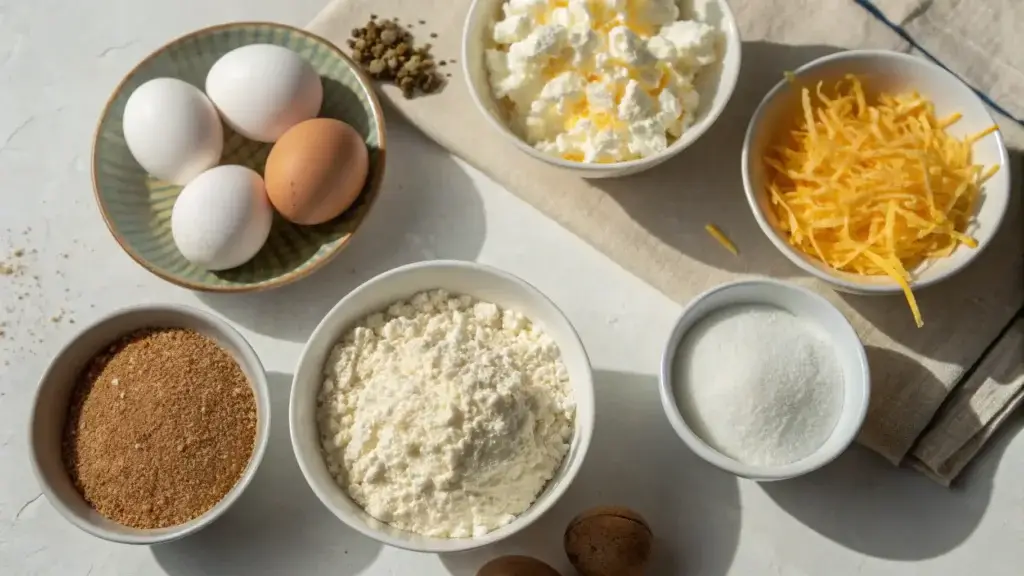
Ingredients Breakdown
Here’s everything I use when I make my go-to cottage cheese pizza crust:
- 1 cup small curd cottage cheese (low-fat or full-fat both work)
- 2 large eggs
- 1/4 cup flour (I use oat or whole wheat, but you can pick what fits your needs)
- 1 teaspoon onion powder
- 1 teaspoon garlic powder
- 1/2 teaspoon dried oregano or Italian seasoning
- 1/2 cup pizza sauce (or any clean marinara)
- 3/4 cup shredded low-fat mozzarella or pizza cheese blend
- 2 oz sliced turkey pepperoni or lean meat of choice
- Optional: pinch of black pepper or red chili flakes
- Optional: 1 tbsp grated parmesan for garnish
These amounts make one medium-sized crust, which I usually cut into four slices. Two slices easily cover one meal, especially post-workout.
What I love about this recipe is that everything can be swapped around. You can pick your flour based on carb goals, use full-fat cheese if you’re bulking, or go low-fat if you’re cutting. Plus, it’s easy to double or triple the batch if you’re cooking for more than one.
Fitness-Friendly Substitutes
If you’re gluten-sensitive, no worries—you can go for gluten-free flour like almond, coconut, or a certified GF blend. Just know that the texture might come out slightly different, especially with coconut flour since it absorbs more moisture.
Don’t like dairy? There are dairy-free cottage cheese options out there now, and you can switch the mozzarella with plant-based cheese. Just keep in mind the protein might drop a bit.
For vegetarians, just skip the meat toppings and load your pizza with roasted veggies, olives, or even tofu crumbles. The crust stays the same.
Now that you’ve got your ingredients lined up, let’s get into how to make it—all step by step, no stress.
If you love easy high-protein ideas with cottage cheese, you’ve got to try these Cottage Cheese Chips, another simple recipe that turns this underrated ingredient into a clean, crunchy snack.
Step-by-Step Instructions to Make It
Making cottage cheese pizza crust is easier than it sounds. No kneading, no yeast, no waiting for dough to rise. It’s a mix-and-bake kind of recipe, perfect when you’re hungry and don’t have time to mess around in the kitchen.
Prep Your Kitchen
Before you begin, preheat your oven to 350°F. Then grab a baking tray and line it with parchment paper. That helps keep the crust from sticking and makes cleanup fast. I like to lightly spray the parchment with olive oil spray just to make sure nothing clings.
Mix It All Together
In a large bowl, add:
- 1 cup of small curd cottage cheese
- 2 large eggs
- 1/4 cup flour (your choice—oat, whole wheat, or GF)
- 1 tsp garlic powder
- 1 tsp onion powder
- 1/2 tsp dried oregano
- Optional: pinch of black pepper
Use a spatula or spoon to mix everything until smooth. You don’t need a blender, but you can use one if you want an extra fine texture. I usually just stir it by hand—it’s quicker and still turns out great.
Bake the Crust First
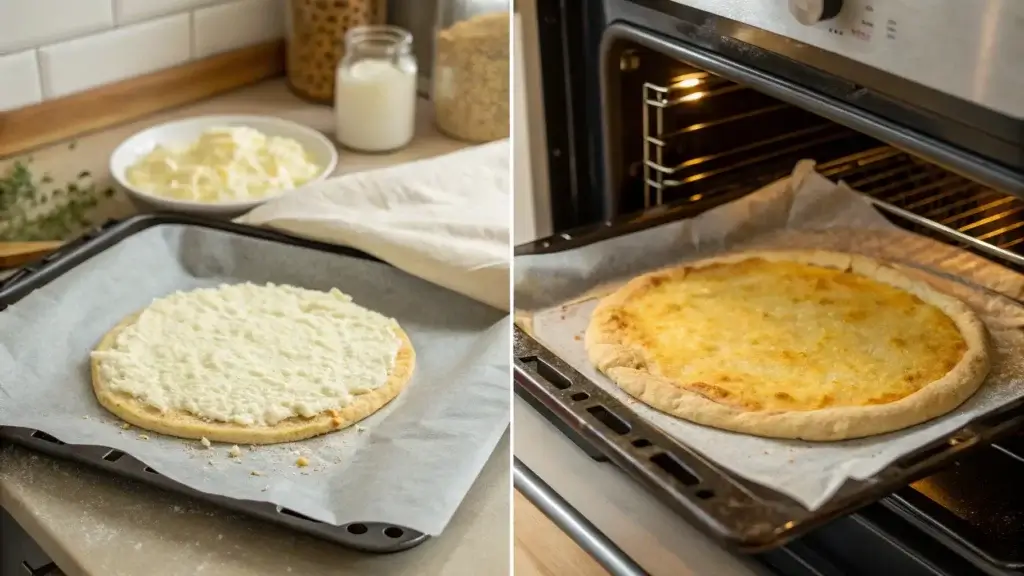
Once the mix is ready, pour it onto your lined baking tray. Use a spoon or spatula to spread it out into a circle or rectangle—whatever fits your tray. Just don’t make it too thin or the crust will break after baking.
Bake in the preheated oven for 25 to 30 minutes, or until the top looks golden brown. The edges should be slightly crisp but not burnt.
When the crust is done, take it out and let it sit for about 2 minutes. That helps the base firm up before adding your toppings.
Add the Toppings and Finish Baking
Now, spread 1/2 cup of pizza sauce across the crust. Then sprinkle on 3/4 cup shredded mozzarella or your cheese of choice. Top it off with 2 oz of turkey pepperoni or any lean protein you like.
Pop it back in the oven for another 5 to 7 minutes—just enough to melt the cheese and bring everything together.
If you’re like me, a sprinkle of chili flakes and a touch of grated parmesan at the end makes it extra satisfying.
That’s it. Your cottage cheese pizza crust is ready. Crispy edges, soft in the middle, and packed with protein.
Craving a savory protein hit first thing in the morning? Try pairing your pizza crust with a side of Homemade Chicken Breakfast Sausage, it’s one of my go-tos for a filling, gym-friendly start.
Nutrition Facts That Fit Your Macros
Eating pizza and sticking to your fitness plan don’t have to be opposites. That’s what makes this cottage cheese pizza crust recipe so awesome. It gives you the pizza flavor you love while hitting solid macro goals, especially for protein. Whether you’re tracking every gram or just eating clean, this one fits right in.
Full Nutrition Breakdown (Per 2-Slice Serving)
| Nutrient | Amount |
|---|---|
| Calories | 421 kcal |
| Carbs | 28 g |
| Protein | 40 g |
| Fat | 16 g |
| Fiber | 2 g |
| Sugar | 5 g |
| Sodium | 1617 mg |
| Calcium | 510 mg |
| Iron | 4 mg |
| Vitamin A | 792 IU |
| Vitamin C | 5 mg |
This is based on using low-fat cottage cheese, turkey pepperoni, and oat flour. If you tweak ingredients, these numbers will change a bit, so adjust according to your goals. For example, using full-fat cheese will add more calories and fat, which can help during bulking. Swapping out the sauce for a low-sugar option can bring the carbs down even more.
Why It Works for an Active Lifestyle
Let’s talk macros. Each serving of cottage cheese pizza crust packs about 40 grams of protein, which is perfect for muscle recovery and staying full longer. The carbs are moderate, making it great for post-workout meals or even a midday lunch that won’t crash your energy.
Also, the fat is just enough to keep it tasty and satisfying without making it heavy. You won’t feel sluggish after eating it—which is a big win when you’ve still got the gym, work, or errands ahead.
Now that the nutrition is on point, let’s talk about how to meal prep this crust and keep it ready for your week ahead.
If you’re looking to build a themed meal around this, you might enjoy the Green Eggs Recipe, a fun, colorful way to keep meals light and protein-rich.
Meal Prep Ideas That Save Time
This cottage cheese pizza crust recipe is perfect for meal prep. Whether you’re planning out your week or just trying to keep healthy choices within reach, it’s easy to make ahead and even easier to grab when you need a quick meal.
Make Ahead Tips for Busy Days
Here’s how I prep this crust to keep my meals fast and stress-free:
- Bake a double or triple batch of the crusts on Sunday
They store really well in the fridge or freezer - Leave the toppings off until the day you eat
That way, the crust stays crisp - Slice the crust after baking and store in meal-size portions
Two slices per container makes the perfect lunch or post-workout snack
If you work long hours or train in the evenings, these ready-made crusts are a lifesaver. You just pop one in the oven or air fryer, top it with sauce, cheese, and whatever protein you’re craving—and five minutes later, it’s pizza time.
Smart Ways to Fit It Into Your Schedule
This crust is flexible enough for any time of day. Here are a few ideas I’ve used:
- Morning fuel: Top it with eggs and spinach for a breakfast pizza
- Afternoon pick-me-up: Add veggies and lean meat for a clean lunch
- Evening refuel: Go heavy on protein if you trained hard that day
It’s also great if you have kids or a family to feed—just let everyone choose their own toppings. You’ll save time, avoid waste, and keep things on track.
For a sweet high-protein prep option to balance out your savory crust, these Banana Bread Mini Muffins are meal prep gold.
How To Store or Freeze It Right
If you’re like me and don’t always have time to cook from scratch, storing your cottage cheese pizza crust the right way makes all the difference. With just a little prep, you can have high-protein meals ready to go for busy weekdays, late-night cravings, or quick post-workout bites.
Storing in the Fridge
Once your crust has cooled, you can store it in the fridge for up to four days. Make sure to wrap it tightly or keep it in an airtight container. I usually slice it first, so I can grab just what I need without reheating the whole thing.
If it’s already topped with sauce and cheese, just make sure everything is cooled before storing. That keeps it from getting soggy.
When you’re ready to eat, reheat it in the oven or air fryer at 350°F for 5 to 7 minutes. You’ll get a crisp texture again without drying it out.
Freezing Tips That Work
Freezing cottage cheese pizza crust is great if you’re meal prepping for longer than a few days. I bake the crust, let it cool, then freeze it plain—no toppings. That way, it doesn’t get watery or lose texture.
Here’s what I do:
- Place parchment paper between each crust to prevent sticking
- Store in a zip-top freezer bag or flat container
- Label with the date so you know how long it’s been there (they last about 2 months)
To reheat, just thaw overnight in the fridge or for 10 minutes at room temp. Then top and bake as usual. It tastes just as good as fresh, and it saves so much time during the week.
I like to prep a batch of Chicken Fajita Pasta alongside my pizza crusts for variety through the week—both freeze and reheat like champs.
Topping & Pairing Ideas That Work for Any Plan
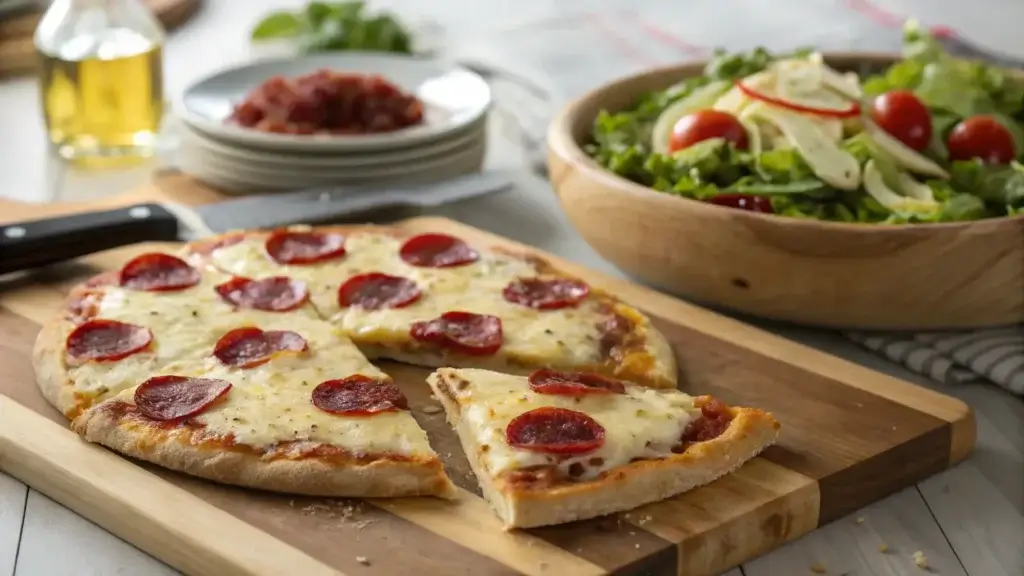
One of my favorite things about cottage cheese pizza crust is how easy it is to switch up the flavors. You can make it bold, cheesy, light, veggie-packed, or high-protein—whatever fits your goals and mood. It’s like having a clean slate every time you cook.
High-Protein Toppings to Keep You Full
If you’re chasing gains or just trying to hit your protein numbers, try some of these topping ideas:
- Grilled chicken breast or shredded turkey
- Sliced boiled eggs or egg whites
- Lean ground beef or turkey
- Tuna or salmon flakes
- Cottage cheese and spinach for extra boost
All of these toppings go great with the flavor of the crust, and they give you solid nutrition without loading on fat or sugar.
Pair It with Clean Sides
To round out your meal, pair your pizza with simple sides that add freshness and fiber:
- Cucumber and tomato salad with a drizzle of olive oil
- Steamed or roasted broccoli, zucchini, or cauliflower
- A small bowl of lentil soup or bone broth
- Greek yogurt dip on the side for dunking slices
These combos keep the meal light but satisfying, especially if you’re watching carbs or calories. I like to change up the sides depending on the time of day or how hungry I am. The goal is to feel good, stay full, and enjoy every bite.
And for dessert that still keeps you on track, I highly recommend my Cottage Cheese Chocolate Mousse, smooth, rich, and just as macro-friendly.
Variations for Different Fitness Goals
One of the best things about cottage cheese pizza crust is how easy it is to adapt for any fitness goal. Whether you’re trying to gain muscle, cut body fat, or lower your carb intake, you can make small changes that still keep the flavor and texture on point.
For Bulking: Add More Fuel
When you’re bulking, you need more calories, protein, and healthy fats to support muscle growth. This recipe already brings in a solid 40 grams of protein, but you can boost it even more without much effort.
Try these easy swaps:
- Use full-fat cottage cheese and extra mozzarella
- Add an extra egg to increase protein and richness
- Top with lean ground beef, sweet potatoes, or black beans
- Drizzle a little olive oil after baking for healthy fat
This version feels more filling and gives you a higher calorie count, which helps when you’re eating in a surplus.
For Cutting: Keep It Light and Clean
If you’re cutting, the goal is to stay full while keeping calories low. Thankfully, cottage cheese pizza crust makes that easy since it’s naturally high in protein and light on carbs, especially if you skip the flour.
Here’s what I do:
- Use low-fat cottage cheese
- Skip flour completely or use almond flour for fewer carbs
- Go light on cheese and load up on veggies
- Use sugar-free sauce or a homemade tomato blend
This still gives you the satisfaction of pizza without going over your macro limits. Plus, it’s perfect for dinner when you’re watching portions but don’t want to feel like you’re dieting.
For Low-Carb or Keto: Ditch the Flour
If you’re on a low-carb or keto plan, you can easily make cottage cheese pizza crust fit your needs. Just skip the flour entirely or swap it with a keto-friendly option.
Try this:
- No flour at all (the crust will be softer but still holds)
- Or use 1–2 tbsp almond flour or coconut flour
- Use full-fat cheese and cottage cheese
- Stick with low-carb toppings like eggs, spinach, or chicken
It’s tasty, filling, and doesn’t knock you out of ketosis. Plus, it gives you a reason to look forward to pizza night again.
FAQs
Can I use large curd cottage cheese instead of small curd?
Yes, you can. But small curd gives a smoother texture. If you’re using large curd, blend it for a few seconds to make it creamier before mixing.
Can I skip the flour completely in this recipe?
Absolutely. Cottage cheese pizza crust still works without flour, though it will come out softer. If you’re okay with using a fork and knife, go for it.
What’s the best way to reheat leftovers?
The oven or air fryer is your best bet. About 5–7 minutes at 350°F makes the crust crispy again. The microwave works too, but the texture may turn softer.
Is this recipe good for kids or picky eaters?
Yes! The crust tastes mild, and you can add any toppings they like. My kids didn’t even notice it was made from cottage cheese the first time I served it.
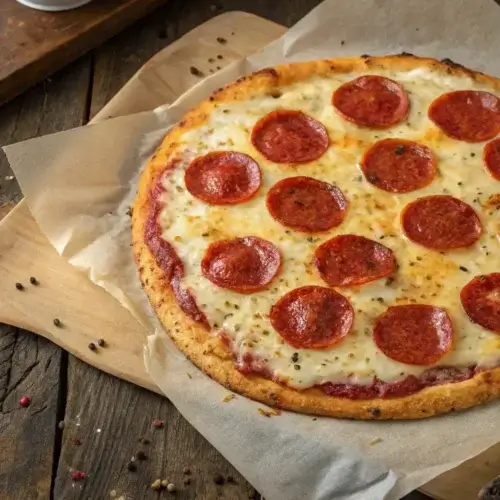
Cottage Cheese Pizza Crust
Ingredients
Crust Base
- 1 cup low-fat cottage cheese small curd
- 2 large eggs
- ¼ cup oat flour or flour of choice
- 1 tsp onion powder
- 1 tsp garlic powder
- ½ tsp dried oregano
- black pepper optional
Toppings
- ½ cup pizza sauce or clean marinara
- ¾ cup shredded low-fat mozzarella cheese
- 2 oz sliced turkey pepperoni
- 1 tbsp grated parmesan optional
- red chili flakes optional
Instructions
- Preheat oven to 350°F. Line a baking sheet with parchment paper and lightly spray with oil.
- In a bowl, mix the cottage cheese, eggs, oat flour, onion powder, garlic powder, oregano, and black pepper.
- Stir well until smooth. You can blend it if you prefer a finer texture.
- Spread the mixture onto the parchment paper in a circle. Don’t spread too thin.
- Bake the crust for 25–30 minutes or until golden brown on the edges.
- Remove from the oven and let it cool for 2 minutes.
- Add pizza sauce evenly over the crust.
- Top with shredded mozzarella and turkey pepperoni.
- Bake again for 5–7 minutes until cheese melts.
- Garnish with grated parmesan and chili flakes if using. Slice and enjoy.


